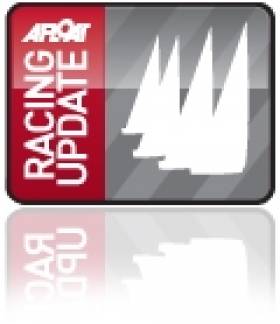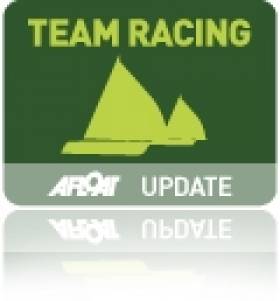Displaying items by tag: royal stgeorge yc
West Kirby Sailing Club narrowly beat the RSGYC Green of the home club 2-1 in the final to win the first Elmo team racing Trophy.
8 teams of under 18 sailors took part, quickly getting to grips with the equally matched fleet of firefly dinghies. Blue skies and fresh breezes on Saturday saw Storm sails fitted as the teams got into their strides.
The experienced and fast team from Schull set the early pace and dominated the first round robin where each team sailed 7 races.
Joining Schull in the Top four and thus into the Gold League were West Kirby and RSGYC GREEN and RSGYC RED. Just missing out and into Silver were Sutton Dinghy Club who were new to Fireflies and to team racing – more to come from them in the Future.

Elmo Trophy Winners
Sunday morning saw gentle breezes and a chance for the young flyers from Bray to post wins on the scoreboard. The weather co-operated all day and allowed the completion of a second round of Gold and Silver racing to be completed.
RSGYC Green won a three way tie to finish as top seeds for the Semi Final knock-outs. RSGYC RED and RSGYC Blue battled it out for the fourth seed with RSGYC RED emerging victorious.
The first Semi Finals saw West Kirby eliminate Schull 2-0 and RSGYC Green knocking out RSGYC RED by the same score. The final was closely fought with WKSC taking the first race only for RSGYC Green to stack the favoured pin in Race 2 and use their speed to sail off with a 1-2 victory. West Kirby showed their experience in the deciding race by dominating the pre-start and establishing a 1-2 combination at the first mark which they would never relinquish. Schull went back to West Cork with the consolation of third place after winning the petit final 2-0.
Special thanks go to the Race Team and Umpires whose efficiency saw each team sail at least 13 races over the weekend.
Final Results
1st West Kirby Sailing Club
Hollie Marston Tom James Ella Marston Henry Hughes Hannah Owen Alex Colquit
2nd RSGYC Green
Conor O'Beirne Molly Boyne Sean Donnelly Sarah Fogarty Patrick Cahill Emily Arrowsmith
3rd Schull
Isaac Mccarthy-Fisher Rosa Lyden Noah Mccarthy-Fisher Harry Durcan Florence Lyden Anna O'Regan
4th RSGYC Red
5th RSGYC Blue
6th Sutton Dinghy Club
7th Bray Sailing Club
8th National Yacht Club
'Elmo' To Be Launched as Royal St. George Yacht Club Remembers Dinghy Racer, Graham Elmes
#elmo – The Royal St. George Yacht Club will name a club launch after after top dinghy racing member Graham Elmes who died tragically last May. 'Elmo' will be launched for the first time tomorrow following a short naming ceremony.
Graham, a popular member of Dun Laoghaire's waterfront, was a champion in a number of Irish dinghy classes and also a driving force in the development of Irish sailing, where he is sorely missed.
According to the RstGYC, Graham's friends from any walk of life are most welcome to attend tomorrow's launching. Tea and Coffee will be served on the balcony at the clubhouse from noon and Elmo will be christened and then launched at 12:30.
#rsgyc – What was expected to be a bumper entry of 180–boats for the Frank Keane BMW Royal St.George Yacht Club Regatta on Saturday ended up breaking the 200 boats mark, leading club officers to declare it the biggest entry in the club's 176–year history. What's more, the event also took in a dedicated White Sails Challenge, a new novice try boating initiative plus some exotic new sportsboats and dinghies within its fleets.
In total, there were 28 classes racing producing a combined fleet of 202 boats. Full results for each fleet are downloadable below as html files.
The Royal St. George Yacht Club's own Boomerang, a Beneteau First 36.7 sailed by the Kirwan Family, were winners in both IRC and ECHO handicap of Cruisers one, one of the biggest IRC classes with 11 boats.
In the dinghy classes, a brand new Irish Moth design sailed by John Chambers finished joint third in the foiling class that was won by Rory Fitzpatrick.
#irishmoth – In another first for Irish sailing, a Bray, County Wicklow design and build of one of the world's leading edge dinghy types will make its debut on Saturday at the BMW Frank Keane Royal St. George Yacht Club regatta on Dublin Bay. Pioneering International Moth Sailor John Chambers will compete in the new foiling hull, from the design board of Chris Allen, against a burgeoning 12–boat Irish fleet that has attracted a range of top Irish dinghy sailors to its ranks.
In recent years, the International Moth, a development class, has literally take flight with the advent of lifting hydrofoils on daggerboard and rudder, which lift the entire hull and skipper above the water surface, dramatically reducing drag and increasing speed. Now Ireland is set to play its role in future development.
'It's a displacement hull, so not designed to foil in anything under six knots', says Allen of the new craft, that took its maiden sail at the National Yacht Club on Wednesday.
Top speeds of Moths can be above 30 knots. Last month, a former American Fireball dinghy sailor became the fastest dinghy sailor in the world, clocking up a time 36.5 knots This high speed is reflected in the International Moth's RYA Portsmouth Yardstick of 600, the fastest of any sailing dinghy or multihull.
The key features of the Irish design is that when the breeze is above six knots it will reach its foiling speed more easily than some existing designs. According to Chris, the Irish hull is a progression of existing designs and the hope is that its 'lift speed' will be quicker so the boat 'flies' sooner.
The design also features a new look at foil control systems with a smoother and more direct automatic adjustment.
The new hull is also 'more boat shaped than boxed shape' says Chris, who claims it is is stiffer than rivals because it has more shape, more rocker and rounded in the sides.
Constructed entirely in carbon fibre and weighing under eight kilograms, the boat will compete at the 2014 World Championships at Hayling Island in the UK in a fortnight in a fleet of 140 boats.
Depending on its world championship performance, Chris hopes the new hull called 'Voodoo' will be the first of many international orders.
The cost of the boat is comparable to other production Moths at approximately €12,000, depending on choice of rig and equipment.
Team Racing Nationals Date Set for Royal St. George YC in November
#teamracing – The Irish Team Racing Association National Team Racing Championships will be sailed out of the Royal St. George Yacht Club on 9th - 10th November.
As the Royal St George Yacht Club celebrates 175 years of existence it is appropriate that the Irish National Championships returns to a club that pioneered team racing. Indeed, according to the accepted version of the birth of the sport, the idea of team racing in identical one-design dinghies took form in the bar of the club, as sailors from West Kirby SC relaxed after a days sailing against sailors from the "George". Two Irish teams, including one from the Royal St George YC, then travelled to West Kirby to compete in the inaugural Wilson Trophy in 1949. Teams from the club then went on to win this prestigious trophy in 1956, 1972and 1974. Many of the 1970's generation of team racers are still active in the club, indeed we hope that at least one of them will be umpiring this year.
Last year's winning team, Wessex Exempt, will return to defend their title, whilst the local team George Knights hope to continue a long winning streak, broken only once in recent year by a team of upstarts - the Gladiators, also from the Royal St George YC. On the other hand the Youth Championship in recent years has been dominated by teams from Schull.
Entries are invited from teams of six sailors from Ireland or elsewhere.
The entry fee is €360, which includes dinner on Saturday night in the club. Teams wishing to enter should contact the Irish Team Racing Association. A pre-entry deposit should be sent to arrive on or before Monday 21st October.
This is the major event on the Irish team racing calendar, both for the sailors and for the umpires. As usual for this event local umpires will be joined by umpires from the UK, and, this year, from Germany.
Associating colleagues from the UK ensures consistency in the application of the rules and in umpire technique. This is essential for teams who hope to compete in the UK and elsewhere. As team racing develops in Europe (albeit in a slightly different form) the prospects for Iirsih team racing have never been better.
To enter, or for further details: [email protected]































































